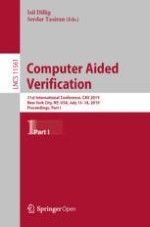This open access two-volume set LNCS 11561 and 11562 constitutes the refereed proceedings of the 31st International Conference on Computer Aided Verification, CAV 2019, held in New York City, USA, in July 2019.
The 52 full papers presented together with 13 tool papers and 2 case studies, were carefully reviewed and selected from 258 submissions. The papers were organized in the following topical sections:
Part I: automata and timed systems; security and hyperproperties; synthesis; model checking; cyber-physical systems and machine learning; probabilistic systems, runtime techniques; dynamical, hybrid, and reactive systems;
Part II: logics, decision procedures; and solvers; numerical programs; verification; distributed systems and networks; verification and invariants; and concurrency.
